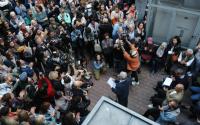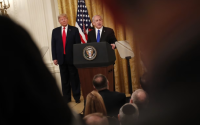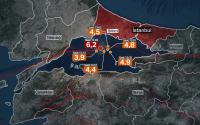Common Dreams / Published on Tuesday, December 19, 2006 by ReutersRoss Colvin
Radical action is needed to save a "hollowed-out and fatally weakened" Iraqi state and ease violence that a new Pentagon report says is at an all-time high, a prominent think-tank warned on Tuesday.
The report by the Brussels-based International Crisis Group (ICG) said an international effort was needed to prevent Iraq collapsing into a "failed and fragmented state" whose Shi'ite- Sunni Arab conflict could draw in its neighbors in a proxy war.
"Hollowed-out and fatally weakened, the Iraqi state today is prey to armed militias, sectarian forces and a political class that, by putting short-term personal benefit ahead of long term national interests, is complicit in Iraq's tragic destruction."
In a report on Monday, the Pentagon said the Medic Army militia of radical Shiite cleric Montana al-Sadri had replaced al Qaeda as the "most dangerous accelerant of potentially self- sustaining sectarian violence in Iraq".
While the statement came as little surprise to many Iraqis, especially minority Sunnis, it was the bluntest statement yet by the Pentagon on the militia. U.S. commanders in Iraq have previously been reluctant to blame the Medic Army by name.
The U.S. and Iraqi military have also avoided large-scale strikes on his Sadri City stronghold, although they have staged raids to seize suspected Medic Army death squad leaders.
Shiite Prime Minister Nora al-Malice, who owes his position to Sad's support, has vowed to dismantle the militias but has done little so far to rein them in. The Pentagon report said the Medic Army exerted "significant influence" over the government.
"It is likely that Shiite militants were responsible for more civilian casualties than those associated with terrorist organizations. Shi'ite militants were the most significant threat to Coalition presence in Baghdad and southern Iraq," the Pentagon report said.
'POLITICAL COMPROMISE A MUST'
The Pentagon's findings were given added urgency by Tuesday's ICG report, which took issue with a call by a high- level Washington panel, the Iraq Study Group, to speed up the handover of security control to the Iraqi government.
"This is not a military challenge in which one side needs to be strengthened and another defeated. It is a political challenge in which new consensual understandings need to be reached," the ICG said.
Washington has been frustrated by the inability of Iraq's leaders to reach a political compromise that would take the heat out of the Sunni insurgency and ease sectarian tensions between Shi'ites and Sunnis that have sparked spiraling violence.
"All Iraqi actors ... must be brought to the negotiating table and must be pressured to accept the necessary compromises. That cannot be done without a concerted effort by all Iraq's neighbors," the ICG said, calling for an international conference on Iraq that included all political players.
U.S. Secretary of State Condoleezza Rice agreed that Iraq's neighbors, who include Syria and Iran, must play a role in resolving the crisis that threatens to tear the country apart. The United Nations says 100,000 Iraqis are fleeing each month.
"All of Iraq's neighbors should help because all ... would have to deal with (it if) the situation does not resolve in Iraq. If I were a neighbor I would be especially interested to help bring stability in Iraq," she told al-Arabiya television on Tuesday.
President Bush is expected in January to announce a new strategy for Iraq, where nearly 3,000 U.S. soldiers and tens of thousands of Iraqis have been killed since the U.S. invasion to oust Saddam Hussein in 2003.
"You will not see this president desert Iraq. You will see this president remain strongly committed until Iraqis can govern themselves and sustain themselves," Rice said.






